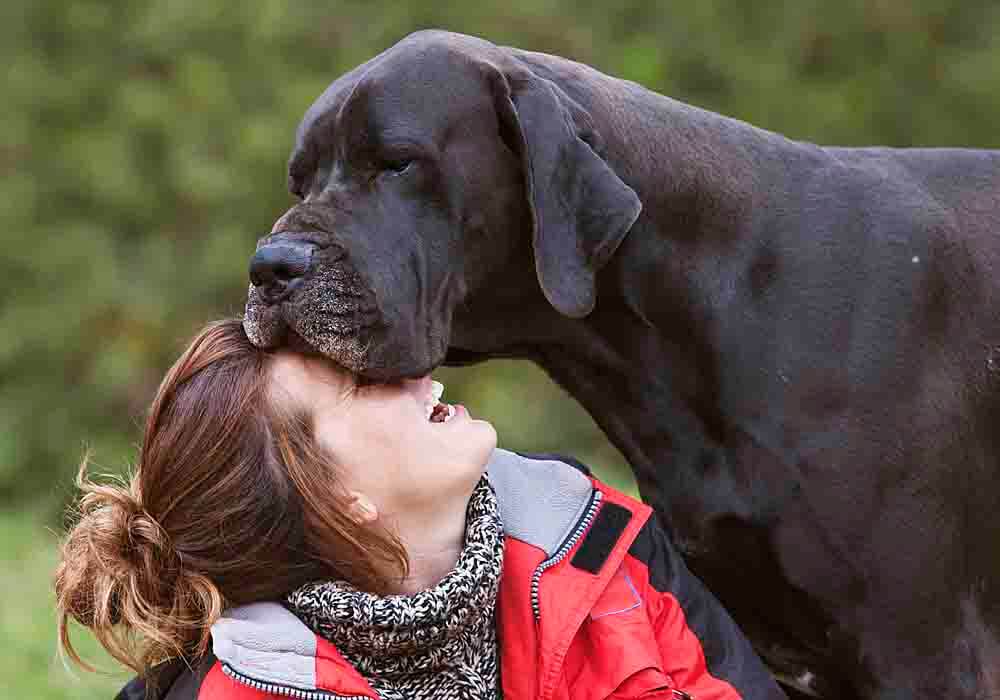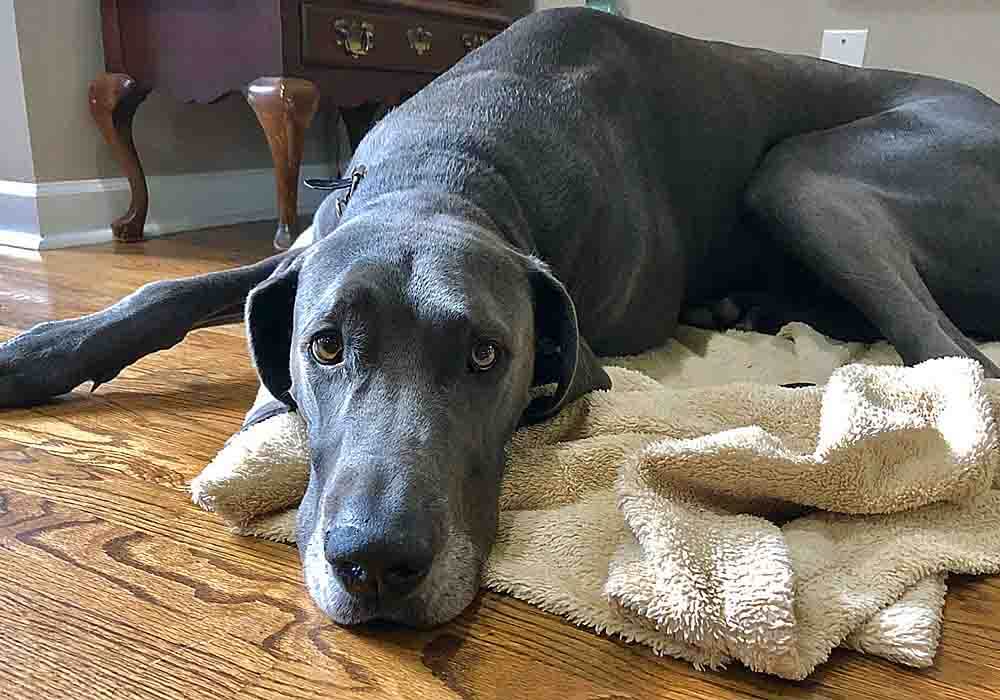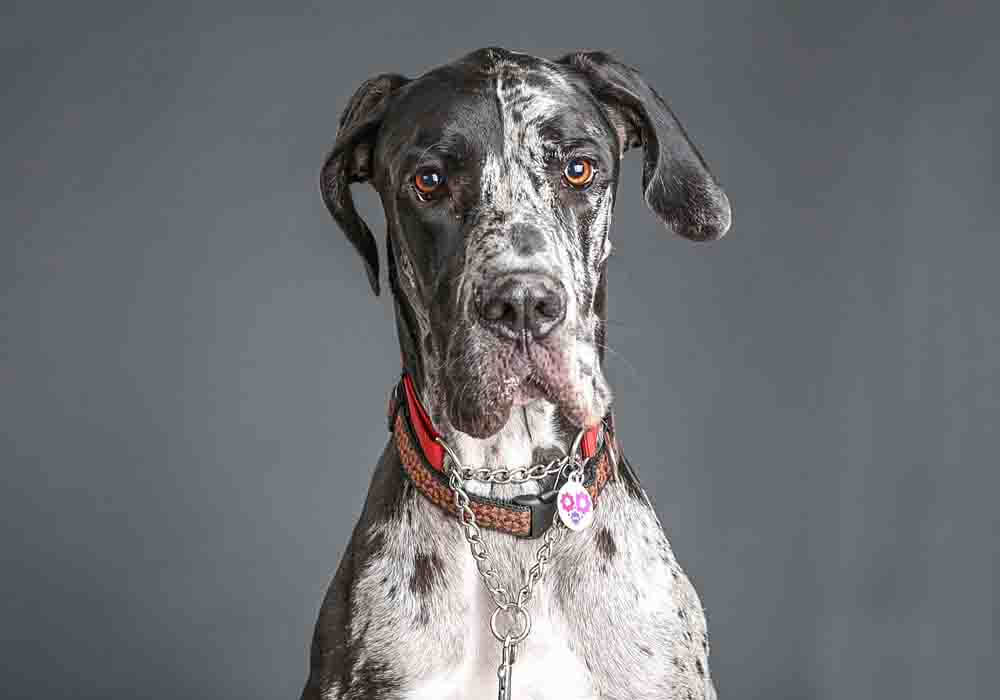Great Danes for Beginners
26 Most Common Questions Asked
by Ken Alden
If you're fascinated by this breed, but you don't know much about them, then this Great Danes for beginners page is for you! If you wonder what it would be like to live with one of these pony-sized pooches then read on...
Great Danes For Beginners Basics...
Great Danes are gentle giants who make excellent family pets and protection dogs. They’re prone to some medical conditions, such as bloat, and require regular vet checkups. But Great Danes don’t require a lot of exercise and will do fine in apartments and smaller spaces if their needs are met.
If you’re interested in owning a Great Dane, you should do a great deal of research and soul-searching before you commit to buying an enormous dog. This article will help by answering 26 common questions about what it’s like to have a Great Dane in your life.
Pro-tip: Ever try lifting a Great Dane? Their weight can hurt not only your back but their joints when they hop down from cars, sofas or even your bed. To protect your back and theirs check out the best Mastiff ramps on Amazon.com now.

Are Great Danes Hard To Take Care Of?
Great Danes aren’t hard to take care of, but they do have some specialized care requirements:
- You must feed Great Danes carefully to avoid bloat.
- You must feed Great Dane puppies large puppy formula food to prevent bone problems.
- You need the upper body strength to handle a big powerful dog on a leash.
- You must be ready for heartbreak as this breed doesn't live as long as many other dogs.
- You must share your home with a gassy, slobbering roommate who regularly knocks things over without picking them up.
Are Great Danes Smart and Easy To Train?
Great Danes are reasonably smart dogs, but they can be difficult to train. When it comes to canine intelligence tests, they’re underachievers.
This breed scores well on adaptive intelligence, which is the skill that helps your dog learn that jingling keys mean a car ride. But Great Danes aren’t so obedient to commands as honor roll students like Poodles and German Shepherds.
The Great Dane's stubborn streak can be challenging at times. They won't growl or challenge your dominance. They’ll simply pretend they didn't hear you. But most Great Danes will master basic commands and respond to your third or fourth request.
Are Great Danes Fussy Eaters?
Great Danes aren’t especially fussy eaters. But you have to be fussy about feeding them. This breed can suffer from gastric tension (bloat) if their stomach gets twisted, and it's painful for the dog, requires surgery to correct, and is often fatal despite intervention. great danes for beginners
These are some ways you can avoid bloat:
- Give your Great Dane 2-3 smaller meals daily, so their stomach is never overful.
- Don't exercise with your dog until at least an hour after eating.
- Don't overfeed your Great Dane.
- Avoid fatty dog food and foods with soybean meals, as these ingredients increase the risk of bloating 400%.
If your dog is retching, restless, and has a swollen abdomen, call a veterinary clinic immediately.
Are Great Danes Expensive To Own?
Great Dane can be expensive to own. An adult Great Dane can eat over a pound (0.6 kg) of food a day. If you're feeding high-quality dry food you can easily spend over $200 a month.
And because this breed is prone to several health conditions, your pet will need regular veterinary checkups and may have medical issues requiring surgery or therapy.
Pro-tip: Great Dane anxiety, aggression, destructive chewing, jumping up, fearfulness, and other behaviors can be controlled with the right training program.
Here’s a great course that
addresses these issues along with many other dog training basics: Check it out now!
Are Great Danes Affectionate?
Great Danes are very affectionate. While they lose some of their youthful enthusiasm (and fondness for chewing) as they get older, they always retain a puppy's unconditional love for their people.
Your Great Dane wants to be the center of your life. They’ll be thrilled at your praise and crushed when you scold them. Some people call this breed loving, while others call them clingy and needy.
Are Great Danes Active Dogs?
Great Danes aren't overly active dogs, but they can be hyper as puppies. You'll need to give your pooch puppy toys to play with, especially chew toys. And while puppies need to exercise, don't overdo it because their bones grow so fast that those who exercise too much can end up with joint issues later in life.
As they get older, they become much more laid back. Adult Great Danes are mostly lower-energy dogs. They don't run when they can walk, and they prefer napping or sitting quietly with their family. You’ll need to make sure they get the regular short walks and outside time that they need to avoid obesity.
Are Great Danes Easy To Potty Train?
Great Danes are easy to potty train and are among the breeds that require less work to housebreak. They're intelligent, and their super-sized bodies also have big bladders that let them hold their urine longer than little dogs.
The easiest and most effective way to potty train your pooch is by crate training. A large crate will leave your puppy feeling safe and secure and has plenty of room for when your pup becomes an adult. See our review of the best large dog crates.
Dogs don't like to be cooped up in their waste. Putting your puppy in the crate at night, then letting them outside in the morning establishes a "bathroom zone" and a "no bathroom zone" in your pack's territory.
Are Great Danes Good for Families?
Great Danes are great for families! They're a fun, lovable, helpful, and educational addition to any household. Having a Great Dane around the house teaches children to love dogs. Getting your children involved in feeding and brushing teaches responsibility and scheduling. And the best thing is, playing with your dog keeps your children occupied.
great danes for beginners

Before bringing a Dane home, be sure to read up on all things new families should know about them in our dedicated article Are Great Danes Good Family Dogs?
Are Great Danes Good for First Time Owners?
Great Danes may not be good for first-time owners because of their enormous size and strength. But a first-time dog owner will do better with a Great Dane than many other giant dog breeds, as they’re less active and far less prone to aggression than many giants. They’re also content with smaller spaces and need less exercise.
But before getting a Great Dane, you should spend some time around giant (130+ lb/60+ kg) dogs to see if you’re up to the challenge of living with one. They’re gentle giants, but they’re also gassy, slobbery, and stubborn.
Pro-tip: Great Dane's (and their owners) love dog crates…and for good reasons. Crates keep dogs from mischief while you're away, are perfect for house training, for traveling by car, and provide the dog a place to de-stress. Check out the best Mastiff crates on Amazon.com now.
Are Great Danes Biters?
Most adult Great Danes aren’t biters. While puppies of this breed love to nibble on things and sometimes play-bite too hard, aggression and biting are very uncommon with this breed of any age. They may bark at strangers, but most of them will only bite as an absolute last resort.
While Great Danes are generally as peaceful as Golden Retrievers, you need to keep an eye on your dog and surroundings. Even gentle breeds can bite if stressed, teased, or threatened. And when a Great Dane bites, the consequences can be far worse than ankle-gnawing from an angry Chihuahua.
Are Great Danes Good Protection Dogs?
Great Danes are good protection dogs, though they're not well-suited for guard dog duty. Protection dogs keep watch over their homes and family members and should intimidate criminals, and this large breed is certainly intimidating.
But a protection dog also has to distinguish between threats and neighbors. Fortunately, the Great Dane reserves their scary bark for real emergencies and happily greets guests.
Are Great Danes Good With Babies?
Great Danes are very good with babies so long as you keep an eye on them! While there may be some difficulties adjusting at first, your pup will soon see your baby as the newest pack member.
But though Great Danes love babies, they’re also gigantic dogs who don’t understand their size and strength. They can easily knock a toddler over or step on a crawling baby who gets underfoot.
You should always supervise your Great Dane, or any other dog, around small children. This supervision protects your dog as much as your baby. Just as puppies don't know they’re play-biting too hard, toddlers don't understand why they shouldn't tug on a dog's ears.

We felt this topic was important enough to write an article dedicated to just this. Be sure to check out our article Are Great Danes Good With Babies and Kids?.
Are Great Danes Good With Cats?
Great Danes are generally very good with cats. Some puppies enjoy chasing cats, squirrels, and other small animals. They don't mean any harm, but that doesn't make the cat feel better. Once they get accustomed to each other, neighborhood cats and Great Danes can typically live together peacefully.
Are Great Danes Good With Small Dogs?
Great Danes are good with small dogs because they’re playful and not inclined towards dog aggression. A puppy of this breed will enjoy playing with the house's smaller dogs -- which will be all the dogs in most households.
While puppies can play rough -- and Great Danes continue many puppy behaviors until they’re 2-3 years old -- they’re not likely to start a fight with your other dogs. But you should also make sure your small pup is good with Great Danes. An intimidated toy dog might bite your rambunctious Great Dane out of sheer terror.
Are Great Danes Good Service Dogs?
Great Danes are also good service dogs and at least one service dog agency specializes in this breed. Since 2003, the Service Dog Project has placed over 190 Great Danes as mobility service dogs that open automatic doors, retrieve objects and dropped items, and brace their partner by serving as moving support.
Carlene White, the founder, matches her Great Dane service dogs to their partners' needs. Parkinson's patients will sometimes "freeze" when walking. A touch to their foot or ankle will break the freeze and let the patient move again. White's service dogs will provide that touch with a helping paw. great danes for beginners
Are Great Danes Good Watch Dogs?
Great Danes are good watch dogs. Their keen sense of hearing means they’re quick to hear wanted or unwanted guests, and their mellow nature keeps them from barking every time somebody passes on the sidewalk.
Most of the time, this dog is quiet. This makes their deep, resonant bark more effective as a warning and alarm. You’ll know there may be trouble outside -- and criminals know they’ll find trouble inside.
Are Great Danes Good Guard Dogs?
Great Danes aren’t good guard dogs. According to Private Security Professionals of America, guard dogs are working dogs, and this breed will be much happier relaxing in a family home than patrolling a warehouse. Their stubborn streak also makes them harder to train.
Are Great Danes Good Jogging Partners?
Adult Great Danes are good jogging partners who love to jog alongside their owners. But you shouldn’t take your Great Dane jogging with you until they’re at least two years old. Great Danes for beginners
It may be hard to remember that your 100-pound (45.36-kg) puppy is only eight months old. But your big baby is still putting on bone mass. Running too long at a young age could lead to dislocations now and arthritis in your dog's later years.
Are Great Danes Good Emotional Support Dogs?
Great Danes can be excellent emotional support dogs. They’re calm, sweet-tempered, affectionate, and good around people. They can bring cheer and companionship to hospital patients, nursing home residents, schoolchildren, or others who need a big furry friend.
These Great Danes love people and are very sensitive to emotional states. When they sense somebody is sad, they’ll try to cheer them up. And it's hard to stay sad around a big, slobbery, tail-wagging bundle of snuggles.
Are Great Danes Good Off-Leash?
Adult Great Danes can be good off-leash and are usually trustworthy and less likely to run off than Great Dane puppies. But you’ll need to keep an eye on them nonetheless.
Many Great Danes behave well off their leash. They play with old and new friends at the dog park and obey your commands the first or second time. But others get distracted more easily and send you sprinting after them as they follow a bird or bother a hot dog vendor.
They generally move at a slower pace, but those long legs means they can run fast. And if they go into traffic or out of your sight, they could run into trouble or even tragedy.
Are Great Danes Good Apartment Dogs?
Great Danes are very good apartment dogs, as giant breeds go. They aren’t overly energetic dogs. So long as you walk them regularly, they’ll be content to stay at home beside their beloved owner. great danes for beginners
But before you bring your puppy home, think about whether or not you’re ready to handle a big dog, and consider the following:
- Look around at your breakables, and remember that this breed is notoriously clumsy.
- Think about what puddles of drool will do to your floor.
- Write an estimated budget for food, veterinary expenses, and possible emergencies.
Are Great Danes Fence Jumpers?
Great Danes are excellent fence jumpers because of their long legs and heavy muscles. You may want to put up a 6-foot (1.8m) or higher fence to keep your Great Dane in your backyard, though as they grow older, your dog will grow less ambitious about jumping and less curious about the world outside.
Are Great Danes Good Swimmers?
Great Danes aren’t especially good swimmers; they can swim, and many love playing in the water. But the Great Dane's long limbs and muscular body make them less buoyant than a Newfoundland, and their short coat offers less protection against chill than a Portuguese Water Dog.
Are Great Danes Nervous Dogs?
Great Danes can be nervous dogs despite their imposing size. Because they’re such loving companions, they can suffer separation anxiety, and the terror of being abandoned by their family can drive them to wreck the house. Crating your dog before you go will leave you both feeling more secure.
This breed is also known to be sensitive to changes inside the home. You know your brother is off to college and will be back after midterms. Your dog may think their buddy has gone forever. Loving reassurance will help your nervous four legged pal conquer their fear.
Are Great Danes Outside Dogs?
Great Danes aren’t great outside dogs. Their short coats and lean bodies offer little protection against the elements. They’re much happier and healthier inside a climate-controlled home.
They also form strong emotional bonds with their owners. They don't want to be outside your home in a kennel -- or worse yet, on a chain. A Great Dane isolated outside is a depressed, angry, and very large dog.
Are Great Danes Protective of Their Owners?
Great Danes are very protective of their owners. Most of the time, their presence is all the protection you need. Nobody smart wants to fight a pony with fangs. And because they are used to being the biggest dog around, they feel no obligation to prove themselves.
If a Great Dane believes their family is in danger, they'll do whatever it takes to drive the threat away. Their warning growl is terrifying, and their bite is even worse than their bark.
Return to the top of this Great Danes For Beginners page

About the Author...
Ken Alden, a dedicated Mastiff owner for over eight years, is acclaimed for his expertise in care, grooming, and training. Read more About Me and my dog Shadow.
- Mastiff Guide Home ›
- Great Danes Dog Info ›
- Great Danes For Beginners







